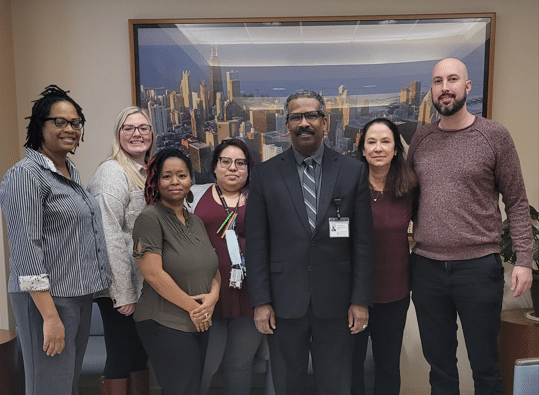Collaborative Bridges is a coalition of six health care organizations coming together to strengthen the continuum of behavioral health care.
CHICAGO, March 30, 2023: A reimagining of healthcare delivery around people and communities is taking shape on the West Side of Chicago. It’s called Collaborative Bridges. Two of the six organizations in the collaborative, Hartgrove Hospital and Community Counseling Centers of Chicago (C4), are now enrolling patients into this unique program of end-to-end support with local, customized support.
C4 has been the provider of crisis assessment and stabilization services for Hartgrove hospital for decades through the states SASS crisis system of care, collaborating to ensure best outcomes and care plans for hundreds of vulnerable youth in crisis a year.
In 2019, Hartgrove and C4 partnered to have Hartgrove provide psychiatric services for C4, ensuring that all C4 members have availability of medication services immediately upon engagement of services at C4.
“C4 and Hartgrove have a shared the vision of ensuring wrap-around support and compassionate treatment of the individuals and families,” said Kerri Brown, CEO of C4 and founding member of Collaborative Bridges. “We are excited to bring forth a much-needed program where the hospital and community-based organization will come together to enhance patient care at or upon discharge.”
“This work through Collaborative Bridges will continue to strengthen our long relationship and ensure that Hartgrove patients that live on the West Side of Chicago have access to Collaborative Bridges model of intensive care coordination and community-based therapy services,” said Steve Airhart, CEO, Hartgrove Hospital.
“We are here to improve the health equity of West Side communities and reduce the gaps in care among disjointed

From left to right: Ellisha Cochran, C4 Collaborative Bridges Supervisor; Sabrina Perrino, Director of Social Services; RaeNette Young, Clinical Director of Collaborative Bridges; Paula Herrera, Emergency Services Director, Hartgrove; Patrick Sanders, Group Chief Clinical Officer, Hartgrove; Carol Kilgallon, Group Director of Business Development, Hartgrove; Patrick Dombrowski, Executive Director of Collaborative Bridges
islands of service,” said Patrick Dombrowski, the newly appointed executive director of Collaborative Bridges. “To do this, we are creating a continuity of care between hospitals and communities to put resources closer to those who need it, when they need it.”
The six coalition partners that have founded Collaborative Partners are: Bobby E. Wright Comprehensive Behavioral Health Center; C4; Habilitative Systems, Inc.; Hartgrove Behavioral Health Systems; Humboldt Park Health; and The Loretto Hospital. The six organizations have a long history and track record of serving the communities on the West Side of Chicago.
While racial and ethnic minorities experience mental health and substance use disorders at the same rate as whites, the illness may go untreated for longer periods of time. This disparity is caused by multiple factors, including access to behavioral health services, cultural stigma associated with mental health, and systemic racism and discrimination. 66% of Latinx and 67% of Black Americans don’t receive treatment for mental health conditions, compared to 55% of the general population.

Patrick Sanders, Group Chief Clinical Officer, Hartgrove; Ellisha Cochran, C4 Collaborative Bridges Supervisor
The Collaborative Bridges model is based on the premise that the lifecycle of a person going from crisis to wellness involves many highly qualified health organizations doing their part all along the journey, including primary care, hospitals, and mental health and substance abuse clinics; but that these networks can function like islands of care. Between these islands are gaps where a person can fall through, either taking a step backward on their road to recovery or abandoning it all together. The Collaborative Bridges models is based on assigning care coordinators to individuals and staying close to them through the entire care journey. The model puts community health workers and peer recovery specialists as key bridge in the continuum of care.
Collaborative Bridges is designed to ensure that the care needs of people experiencing mental health and substance abuse are supported in their community, especially after a hospital admission.
Collaborative Bridges is part of the Illinois Department of Health and Family Services’ Healthcare Transformation Collaboratives (HTC). HTC establishes collaboratives of different community-based service providers to close gaps. These collaborations, each with their own geographic footprint and clinical focus, are standing up across the State. Each are looking at the care lifecycle broadly, from the patient’s perspective and within a hyper-local community context.


